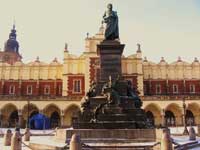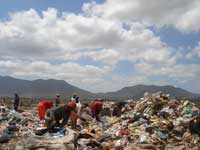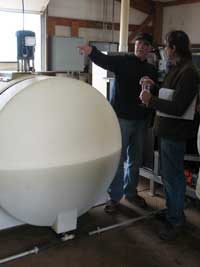Subcommittee Updates
The Global Methane Initiative's (GMI's) Administrative Support Group (ASG) convened all four subcommittees via webinars earlier this month. This was the ASG's first use of virtual meetings to encourage greater participation by both delegates and Project Network members. Webinar participants are encouraged to contact ASG or Subcommittee chairs with opinions on the success of the webinars.
Additionally, the ASG provided an update on new Partner Countries and discussed draft guidance that was recently distributed for development of GMI Partner Action Plans (see Moving Forward with GMI Partner Action Plans). Details for each webinar are highlighted below.
Agriculture
The GMI Agriculture Subcommittee meeting took place on 14 June 2011. The webinar
was attended by nearly 20 participants, with several applauding the webinar format.
Topics discussed included an update on international collaboration and the availability
of the Agriculture Subcommittee Co-Chair position. Additionally, the international
database of anaerobic digestion systems was discussed; it is anticipated to go online
later this year. Other agenda items included possible future work of the Subcommittee
and ideas to increase country and Project Network participation, including a potential
webinar on ways Project Network members can better participate in GMI.
Presentations as well as the audio recording are posted on the Agriculture Subcommittee Web page.
Coal Mines
The Coal Mines Subcommittee held its webinar on 20 June 2011 and was attended by
more than 30 participants. Partner Countries, including Australia,
China, India, Indonesia,
Mongolia, and the United States, reported on projects
that are completed or are in development since the last Subcommittee meeting in
October 2010, relevant policy changes, and provided an overview of activities planned
for the rest of 2011. In addition, Ray Pilcher with Project Network member
Raven Ridge Resources provided an update on the United Nations Economic
Commission for Europe's activities to disseminate information from the
Best Practice Guidance for Effective Methane Drainage and Use in Coal Mines
(PDF, 86 pp, 1.8 MB).
 It was also noted during the webinar that a draft paper addressing flaring of drained
coal mine methane and a draft update to the
technology database (PDF, 14 pp, 122K) will be available soon. The ASG will
distribute the materials and request feedback from the Subcommittee when available.
Attendees also discussed the agenda for the next Subcommittee meeting, and anyone
interested in assisting with development of the agenda for technical sessions should
email the ASG at asg@globalmethane.org.
It was also noted during the webinar that a draft paper addressing flaring of drained
coal mine methane and a draft update to the
technology database (PDF, 14 pp, 122K) will be available soon. The ASG will
distribute the materials and request feedback from the Subcommittee when available.
Attendees also discussed the agenda for the next Subcommittee meeting, and anyone
interested in assisting with development of the agenda for technical sessions should
email the ASG at asg@globalmethane.org.
Presentations will be posted on the Coal Mines Subcommittee Web page within the next few weeks.
Save the Date for the GMI Partnership-Wide Meeting
The ASG is pleased to announce the 2011 GMI Partnership-Wide Meeting will be held 12-14 October 2011 in Krakow, Poland. The event will include sector-specific site tours, plenary sessions, technical and policy sessions, a Steering Committee meeting, and countless networking opportunities. GMI is grateful to the government of Poland for hosting this important meeting. Registration and agendas will be available soon on GMI's website.
Landfills
The Landfill Subcommittee met on 1 June 2011. The webinar, attended by nearly 30
participants, included a discussion of the new outreach activities that promote
the expanded GMI scope of methane abatement and wastewater sectors. In addition
to these administrative updates, each delegate identified their priority methane
abatement technologies (e.g., composting, anaerobic digestion, and waste-to-energy)
and ongoing or planned abatement activities in their country, as well as a needs
assessment (e.g., development of abatement technology white papers or fact sheets).
This information will be used to tailor the scope of the subcommittee and to develop
a guidance document to help countries evaluate appropriate technologies.
In closing, the Co-Chairs updated delegates on recent outreach activities planned for the wastewater sector and solicited volunteers to assist with peer review of the International Landfill Gas Project Best Practices Guide. The U.S. Co-Chair announced that U.S. EPA will soon issue a new call for proposals for its annual GMI grant solicitation and anticipates an expanded scope to include wastewater, abatement capacity building, site assessments, and inventories in GMI Partner Countries.
Presentations and the audio recording are posted on the Landfill Subcommittee Web page.
Oil and Gas
The Oil and Gas Subcommittee met on 15 June 2011 and was attended by nearly 20 participants.
Partner Countries Canada, India, Mexico, and the United States
provided brief updates on relevant activities in which they had been involved since
the last Subcommittee meeting. These updates included a discussion of issues or
barriers preventing methane emission reduction projects in their country. Participants
also discussed how their country engages in other international initiatives, seeking
to describe how GMI fits within a country's priorities and how it could be improved
to meet their needs. There was initial discussion with Subcommittee and Project
Network members to identify a work product that members would be willing to develop
and support. This topic will be discussed further at the next Subcommittee meeting.
The ASG presented their ideas on the next Subcommittee meeting format and solicited ideas for the technical and policy sessions. Several potential agenda topics were put forth during the webinar. Everyone is encouraged to send topics of interest for discussion at the next meeting to the ASG at asg@globalmethane.org.
Webinar proceedings and the audio recording are posted on the Oil and Gas Subcommittee Web page.
Spotlight on Brazil
Related GMI Efforts in Brazil
Brazil, a GMI charter member since 2004, has several ongoing GMI efforts to capture and use LFG. In April, Chris Godlove, a GMI representative from U.S. EPA, travelled to Brazil to meet local officials, learn about specific projects, and research potential applications for landfill technologies. In June, he also spoke at the International Seminar on Sustainable Wastewater Treatment Operation, held in Brazil. The presentation (Spanish only) (PDF, 26 pp, 1.1 MB) included details from a paper recently released on wastewater technologies.
Similarly, the National Association of Regulatory Utility Commissioners, a 2009 GMI grant recipient, is continuing its work to create a regulatory toolkit that will foster the adoption of LFG recovery and use within the Brazilian waste sector.
Brazil Develops Community-Based LFG Projects
In 2009, a team from Appalachian State University (ASU) Energy Center, a multi-disciplinary
program in Boone, North Carolina, United States that conducts energy
research and activities, began looking for rural communities outside the United
States that would benefit from their experience and strategies for sustainable economic
development. With funding from a 2009 GMI grant, a team led by Stan Steury and Jeff
Ramsdell began collaborating with local officials in the arid northeast region of
Ceará, Brazil to identify sites well suited for community-based
landfill gas (LFG) economic development opportunities. While most cities ship their
garbage out of view, some Brazilians make a living combing through landfills to
find recyclables to sell. With a statewide population of 8.4 million people and
approximately 12,000 catadores ("waste pickers"), Ceará is no exception.
The team from ASU began to research the potential for recovering LFG, focusing on energy and community needs. ASU faculty and students brought hands-on experience from facilitating community-based LFG energy projects in rural communities within North Carolina. ASU believed that rural areas in Brazil could also benefit from their experience in utilizing LFG as an inexpensive and clean source of local energy. Both share the need for cheap and reliable energy sources to provide jobs, economic opportunities for small businesses, improved quality of life, and environmental protection.
The timing of the project is ideal, as government officials in Ceará aim to transition toward sanitary landfills. The ASU team toured seven landfills for potential economic development opportunities. Based on the potential for LFG projects and interest by local officials, the team selected the Maracanaú Landfill as their pilot project for LFG development. Based upon preliminary models, the landfill is estimated to reduce 56,000 metric tons of carbon dioxide equivalent (MTCO2E) per year, as well as produce 850 cubic meters per hour of LFG, with the potential for more as waste is added. During their time in Brazil, the team formed close relationships with local officials, five of whom visited North Carolina in June 2010 to tour successful LFG energy projects.
Technology Transfer to Catadores
At the Maracanaú Landfill, the collection and trade of recyclable materials
supports 75 families. After seeing the area and meeting the local people, the ASU
team felt that assisting the catadores was an important goal. In addition to the
LFG benefits, the project hopes to earn revenue from the sale of recycled materials
as well as the sale of carbon credits. To help raise funds, ASU students collected
more than $2,000 from a showing of Waste
Land
 ,
a documentary film about the artist Vik Muniz, to give to the catadores. The film
shows the life of catadores at Jardim Gramacho, the world's largest landfill located
outside Rio de Janeiro, where nearly 3,000 catadores pick 200 tons of recyclable
materials every day.
,
a documentary film about the artist Vik Muniz, to give to the catadores. The film
shows the life of catadores at Jardim Gramacho, the world's largest landfill located
outside Rio de Janeiro, where nearly 3,000 catadores pick 200 tons of recyclable
materials every day.
Throughout the process, GMI staff has provided technical support to overcome hurdles. The ASU team has developed a conceptual plan for a sorting facility in Ceará, using technology that is inexpensive, dependable, and easily maintained and repaired. For example, a modified automobile engine may be used to generate electricity, instead of a large reciprocating engine, to ensure access to spare parts as well as local repair expertise. In addition to using the LFG for electricity, the project in Maracanaú is exploring industrial uses, such as a plastic manufacturing facility, using recycled materials collected by the “catadores.”
U.S. EPA anticipates that it will be able to provide funding to ASU to complete
the second phase of planning and design, as well as to investigate the potential
for other solid waste management systems. In addition to this, ASU is seeking other
funds to construct the LFG collection system. By transferring personal expertise
as well as technology, the team from ASU hopes they can deliver sustainable business
options to turn garbage into a revenue stream for local residents. For more information,
review Stan Steury's
presentation from the 2011 U.S. EPA Landfill Methane Outreach Program's Conference
(PDF, 31 pp, 1.8 MB)
 .
.
Available Soon: Grants for Activities to Advance Methane Recovery and Use
U.S. EPA intends to issue a grant solicitation in late July or early August 2011 to fund projects and activities that support GMI. Through this upcoming solicitation, U.S. EPA expects to award cooperative agreements ranging from $100,000 to $750,000 per award, for up to a total of $5 million.
Successful proposals will support the Initiative's goal to advance project development in five major interest areas: agriculture (manure management), coal mining, landfills, oil and gas systems, and wastewater. Organizations eligible for this grant include:
- International governments
- Not-for-profit organizations
- States
- Local governments
- Universities
The project period for awards is expected to be July 2012 through July 2015. Information
will be posted soon on U.S. EPA's
Global Methane Initiative website
 .
GMI will also send out an email announcement once available. To be added to the
mailing list, please contact the ASG.
.
GMI will also send out an email announcement once available. To be added to the
mailing list, please contact the ASG.
Moving Forward with GMI Partner Action Plans
In October 2010, the Steering Committee agreed on the need for overarching GMI Partner Action Plans and tasked the ASG with developing guidance. As stated in the Terms of Reference, "Action plans can be useful tools in advancing project implementation, facilitating investment, and creating appropriate policy frameworks that support methane abatement, recovery, and use." The goals of the GMI Partner Action Plans include:
- Articulating the overall vision for a Partner's participation in GMI.
- Outlining key country activities and priorities.
- Providing a mechanism to advance cooperation between Partners by identifying needs and opportunities.
GMI is hopeful that the development of Partner Action Plans will help drive current and future project development activity in all four sectors. The ASG distributed draft guidance to all country delegates for review—and is now compiling comments with a goal of providing final guidance for Steering Committee approval at the October Steering meeting in Krakow, Poland. If you are a delegate and did not receive this draft guidance, or have any questions, please contact the ASG.
Mexican LFG Energy Project Becomes Operational
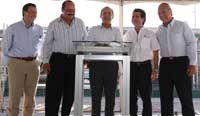 Mexico's President Felipe Calderón (center)
was joined by Mexican officials to celebrate the opening of an LFG utilization project
at the Ciudad Juárez Landfill.
Mexico's President Felipe Calderón (center)
was joined by Mexican officials to celebrate the opening of an LFG utilization project
at the Ciudad Juárez Landfill.
On 20 May 2011, Mexican officials, including the President of Mexico, celebrated the opening of an LFG utilization project at the Ciudad Juárez Landfill in the state of Chihuahua, Mexico. The project, supported by GMI, will reduce greenhouse gas emissions by capturing the methane and using it to generate electricity that will feed into the national power grid. The project provides a model for a sustainable approach for governments to better manage landfills and comply with environmental standards. Another benefit was the employment opportunities generated from its construction and in the operation and maintenance of the system.
Sources: Eco2data, Ciudad Juárez
Landfill Gas to Energy Project
 ;
Presidencia de la República, "El
Presidente Calderón Durante La Inauguración de la Planta Biogas de
Juárez (Spanish only),"
;
Presidencia de la República, "El
Presidente Calderón Durante La Inauguración de la Planta Biogas de
Juárez (Spanish only),"
 20 May 2011.
20 May 2011.
GMI Outreach
GMI Webinar on Project Financing Options
On 13 April 2011, GMI held a webinar
about potential methane emission project financing options available from the Overseas Private Investment Corporation (OPIC)
 .
As the United States' development finance institution, OPIC works with the U.S.
private sector in over 150 countries to gain footholds in emerging markets and catalyze
revenues, jobs, and growth opportunities at home and abroad. With an increased focus
on renewable energy, OPIC has recently launched a series of major initiatives, including
a call for proposals from private equity funds through which OPIC will provide at
least $300 million in financing to support investments in renewable energy, energy
efficiency, and the sustainable utilization of natural resources.
.
As the United States' development finance institution, OPIC works with the U.S.
private sector in over 150 countries to gain footholds in emerging markets and catalyze
revenues, jobs, and growth opportunities at home and abroad. With an increased focus
on renewable energy, OPIC has recently launched a series of major initiatives, including
a call for proposals from private equity funds through which OPIC will provide at
least $300 million in financing to support investments in renewable energy, energy
efficiency, and the sustainable utilization of natural resources.
Below are a few activities GMI has been engaged in to promote methane use and recovery.
- In April 2011, GMI attended the International Workshop on Methane Emissions Reduction Technologies in the Oil and Natural Gas Industry in Huadong, China. The event was hosted by China University of Petroleum (Huadong), U.S. EPA, and RTI International. The workshop focused on methane emissions from the production, processing, and transmission of oil and natural gas. Topics discussed at the event included an overview of methane emissions in the oil and natural gas industry, methane leak detection technologies, methane emissions reduction technologies, associated gas and natural gas recovery and utilization technologies, and energy efficiency in the oil and natural gas industry.
- In May 2011, a GMI representative attended and spoke at the
Solid Waste Treatment and Disposal: Leading Edge Technologies Conference
 in Moscow, Russia. The event was organized by the International
Solid Waste Association (ISWA) and SIBICO International Ltd. The conference brought
together solid waste managers, practitioners, operators, policy-makers, manufacturers,
vendors, and other specialists. Session 4 of the conference, sponsored by GMI, focused
on experience in LFG extraction and utilization technology applications. Presenters
from Partner Countries such as Germany, Russia, and Ukraine
discussed current solid waste management and LFG recovery projects and future initiatives
in Eastern Europe.
in Moscow, Russia. The event was organized by the International
Solid Waste Association (ISWA) and SIBICO International Ltd. The conference brought
together solid waste managers, practitioners, operators, policy-makers, manufacturers,
vendors, and other specialists. Session 4 of the conference, sponsored by GMI, focused
on experience in LFG extraction and utilization technology applications. Presenters
from Partner Countries such as Germany, Russia, and Ukraine
discussed current solid waste management and LFG recovery projects and future initiatives
in Eastern Europe. - In May 2011, GMI helped sponsor and participated in the
Gas Flaring and Venting Measurement Workshop
 in Villa Hermosa, Mexico. The workshop provided information on
Pemex's Strategic Flare/Vent/Fugitives Measurement Plan and the newly formed Grupos
de Medición. Also covered during the workshop were the current best practices
on measuring gas flare and fugitive volumes, as well as key constraints and considerations
when selecting flare measurement systems for both new and existing flaring and fugitive
installations.
in Villa Hermosa, Mexico. The workshop provided information on
Pemex's Strategic Flare/Vent/Fugitives Measurement Plan and the newly formed Grupos
de Medición. Also covered during the workshop were the current best practices
on measuring gas flare and fugitive volumes, as well as key constraints and considerations
when selecting flare measurement systems for both new and existing flaring and fugitive
installations. - In May 2011, Monica Shimamura, co-director of GMI's ASG, met with the two Agriculture
Subcommittee Co-Chairs, Anil Dhussa, from India's Ministry of New
and Renewable Energy and Jorge Hilbert from Argentina's INTA, as
well as Allison Costa from U.S. EPA's AgSTAR Program. The meeting took place at
the Sixth AgSTAR
National Conference
 on 10-12 May 2011 in Idaho, United States. The purpose of the meeting
was to develop a strategy to increase subcommittee participation and collaboration
between the Partner Countries. Several outcomes were achieved by the meeting, including
the realization for the need to develop projects for joint collaboration for the
subcommittee members and the need for the ASG to find new ways to engage delegates.
Another benefit of this meeting during the AgSTAR Conference was that both Mr. Dhussa
and Mr. Hilbert were able to learn more about the U.S. anaerobic digester industry
and network with U.S. businesses.
on 10-12 May 2011 in Idaho, United States. The purpose of the meeting
was to develop a strategy to increase subcommittee participation and collaboration
between the Partner Countries. Several outcomes were achieved by the meeting, including
the realization for the need to develop projects for joint collaboration for the
subcommittee members and the need for the ASG to find new ways to engage delegates.
Another benefit of this meeting during the AgSTAR Conference was that both Mr. Dhussa
and Mr. Hilbert were able to learn more about the U.S. anaerobic digester industry
and network with U.S. businesses. - In June 2011, GMI presented on LFG utilization at the
Mayoral Training Event (Chinese only)
 in Beijing, China. The training is one of many such courses held
by the National Academy for Mayors of China, which is an institution under GMI Partner
organization the Ministry of Housing and Urban-Rural Development of China. Attended
by nearly 50 mayors from cities throughout China, the event focused on solid waste
management technologies and integrated solid waste management approaches, including
LFG energy, anaerobic digesters, and municipal waste combustion. As part of the
training, there was a site visit to the
Gaoantun Landfill, where in 2007 GMI conducted a pump test at the landfill
and prepared a pre-feasibility study based on site-specific landfill data.
in Beijing, China. The training is one of many such courses held
by the National Academy for Mayors of China, which is an institution under GMI Partner
organization the Ministry of Housing and Urban-Rural Development of China. Attended
by nearly 50 mayors from cities throughout China, the event focused on solid waste
management technologies and integrated solid waste management approaches, including
LFG energy, anaerobic digesters, and municipal waste combustion. As part of the
training, there was a site visit to the
Gaoantun Landfill, where in 2007 GMI conducted a pump test at the landfill
and prepared a pre-feasibility study based on site-specific landfill data. - In June 2011, GMI attended the
Carbon Expo
 in Barcelona, Spain. The event, attended by more than 2,600 visitors
from 110 countries, provided attendees the opportunity to explore the detailed development
of carbon markets worldwide and interrelated policies that will shape international
climate policy. A new GMI booth design was debuted at the event to reach out to
new and existing Partner countries and to the carbon development community. Participants
from multilateral development banks, potential new partner countries and others
involved, in the international carbon market stopped at the GMI booth to discuss
the Initiative and how they might participate (including representatives from
Burkina Faso, Colombia, Egypt, Tanzania,
Norway, Guatemala, Singapore,
Malaysia, Lithuania, and Madagascar).
in Barcelona, Spain. The event, attended by more than 2,600 visitors
from 110 countries, provided attendees the opportunity to explore the detailed development
of carbon markets worldwide and interrelated policies that will shape international
climate policy. A new GMI booth design was debuted at the event to reach out to
new and existing Partner countries and to the carbon development community. Participants
from multilateral development banks, potential new partner countries and others
involved, in the international carbon market stopped at the GMI booth to discuss
the Initiative and how they might participate (including representatives from
Burkina Faso, Colombia, Egypt, Tanzania,
Norway, Guatemala, Singapore,
Malaysia, Lithuania, and Madagascar). - Also in June, ASG conducted several planning meetings with Poland government ministries and others to prepare for a fall GMI all-partnership meeting now planned for 12-14 October in Krakow, Poland. The government of Poland agreed to host the meeting and included this event as a deliverable that was discussed in a 29 May White House press release describing outcomes of President Obama's May visit to Warsaw. At the planning meetings, Poland agreed that this event will include site visits, a GMI Steering committee meeting, a high-level plenary session and four technical and policy sessions focused on the specific methane sectors covered by GMI.
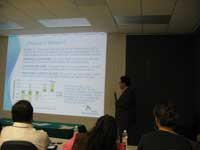 Jorge Alberto Plauchu from Project Network member
TetraTech presented at the Gas Flaring and Venting Measurement Workshop.
Jorge Alberto Plauchu from Project Network member
TetraTech presented at the Gas Flaring and Venting Measurement Workshop.
U.S. and Poland Cooperate on Clean Energy
In May 2011, U.S. President Obama and Poland's Prime Minister Tusk reaffirmed the importance of combating global climate change. The two leaders agreed to hold a high-level session of the U.S.-Poland Strategic Dialogue on clean and secure energy cooperation, aimed at enhancing energy security; building research and development cooperation on energy technologies; and expanding U.S. investments, exports, and participation in technology in Poland. Poland will be hosting some upcoming meetings, including the GMI's Steering Committee, the next U.S.-European Union Energy Council meeting, and the Fall meeting of the U.S.-Polish Business Roundtable, which will provide further opportunities to advance the countries' joint energy interests.
Source: The White House, "Fact
Sheet: U.S.-Poland Cooperation on Clean Energy,"
 28 May 2011.
28 May 2011.
Upcoming Outreach Activities
-
 Registration
began for the African
Carbon Forum
Registration
began for the African
Carbon Forum
 ,
taking place on 4–6 July 2011 in Marrakech, Morocco. The
event is designed to share information and facilitate business opportunities. Government
officials from Africa, as well as representatives from GMI, will discuss current
solid waste management and LFG recovery projects and future initiatives in Africa
in hopes of improving solid waste disposal practices and advance LFG recovery opportunities
in Ethiopia, Ghana, and Nigeria.
On 6 July, GMI will hold a side event, moderated by U.S. EPA and featuring speakers
from Ethiopia and Nigeria, who will discuss advancing landfill methane projects
and public health benefits through the advancement of improved solid waste practices.
There is no charge for the forum, but
registration
,
taking place on 4–6 July 2011 in Marrakech, Morocco. The
event is designed to share information and facilitate business opportunities. Government
officials from Africa, as well as representatives from GMI, will discuss current
solid waste management and LFG recovery projects and future initiatives in Africa
in hopes of improving solid waste disposal practices and advance LFG recovery opportunities
in Ethiopia, Ghana, and Nigeria.
On 6 July, GMI will hold a side event, moderated by U.S. EPA and featuring speakers
from Ethiopia and Nigeria, who will discuss advancing landfill methane projects
and public health benefits through the advancement of improved solid waste practices.
There is no charge for the forum, but
registration
 is required to attend.
is required to attend. - The United Nations Seventeenth
Conference of the Parties
 (COP 17) will be held from 28 November to 9 December 2011 in Durban, South Africa.
Watch for more details, including a potential side event hosted by GMI.
(COP 17) will be held from 28 November to 9 December 2011 in Durban, South Africa.
Watch for more details, including a potential side event hosted by GMI.
Recent Developments and Resources
New Partnership Supports GMI in the Solid Waste Sector
On 1 June 2011, U.S. EPA and ISWA launched a joint effort to collaborate on public
health, climate, and energy issues as outlined in a
Memorandum of Understanding (PDF, 6 pp, 86 KB)
 .
The announcement was made during the "Solid Waste Treatment and Disposal: Leading
Edge Technologies" conference in Russia. EPA's partnership
with ISWA will allow increased access to professional networks and technical expertise,
as well as provide opportunities for information exchange in the solid waste sector
through GMI.
.
The announcement was made during the "Solid Waste Treatment and Disposal: Leading
Edge Technologies" conference in Russia. EPA's partnership
with ISWA will allow increased access to professional networks and technical expertise,
as well as provide opportunities for information exchange in the solid waste sector
through GMI.
- World Bank Agreement Will Help Cities Control Climate Change. On
1 June 2011, Project Network member the
World Bank signed an agreement with mayors from 40 of the world's biggest
cities to focus on technical and financial assistance for projects to minimize the
effects of climate change. This agreement was announced at the
C40 São Paulo Summit
 held in Brazil. As part of the mutual agreement,
the participants will establish:
held in Brazil. As part of the mutual agreement,
the participants will establish: - A consistent approach to climate action plans and strategies to enable stronger partnerships and to permit potential investors to identify opportunities across cities.
- A common approach to measuring and reporting on city greenhouse gas emissions to allow verifiable and consistent monitoring of emissions reductions, identify actions that result in the greatest emission reductions, and facilitate access to carbon finance.
The development of a standard approach for developing action plans and protocols for quantified emission reductions will reduce obstacles for cities to access funding to implement greenhouse gas emission reduction activities. Former U.S. President Bill Clinton applauded the agreement and provided as an example that capturing methane from landfills as a power source "would solve a public health problem, give massive amounts of land back to cities...[and] would put huge numbers of people back to work."
Sources: C40 Cities, "C40
and World Bank Form Groundbreaking Climate Change Action Partnership,"
 1 June 2011; Alexei Barrionuevo, "World
Bank to Help Cities Control Climate Change,"
1 June 2011; Alexei Barrionuevo, "World
Bank to Help Cities Control Climate Change,"
 The New York Times, 1 June 2011.
The New York Times, 1 June 2011.
- Global Legislators Organisation Releases Legislation Study. In
April 2011, the Globe Legislators Organisation for a Balanced Environment, also
known as GLOBE International, partnered with the Grantham Research Institute on
Climate Change at the London School of Economics to produce the
GLOBE Climate Legislation Study (PDF, 276 pp, 2.4 MB)
 .
The study looks into the status of climate change legislation in 16 of the world's
largest economies, 13 of which are GMI Partner Countries. It shows that climate
change is being addressed through legislation in all of the countries covered by
this study. Although the approach differs, due to national priorities and circumstances,
the overall goal of legislation in the countries is to reduce greenhouse gas emissions
and prepare each country for the impacts of climate change.
.
The study looks into the status of climate change legislation in 16 of the world's
largest economies, 13 of which are GMI Partner Countries. It shows that climate
change is being addressed through legislation in all of the countries covered by
this study. Although the approach differs, due to national priorities and circumstances,
the overall goal of legislation in the countries is to reduce greenhouse gas emissions
and prepare each country for the impacts of climate change.
